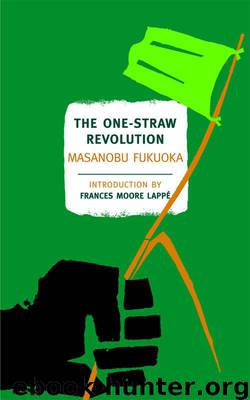The One-Straw Revolution: An Introduction to Natural Farming by Masanobu Fukuoka; Larry Korn; Wendell Berry; Frances Moore Lappe

Author:Masanobu Fukuoka; Larry Korn; Wendell Berry; Frances Moore Lappe
Language: eng
Format: mobi
Tags: Technology & Engineering, Ecology, Health & Fitness, Nature, Agriculture, No-tillage - Japan, General, Organic, Sustainable Agriculture, Organic farming, Organic farming - Japan, No-tillage, Japan, Healthy Living, Gardening
ISBN: 9781590173138
Publisher: New York Review of Books
Published: 2009-06-02T10:00:00+00:00
A Modest Solution to a Difficult Problem
So it appears that government agencies have no intention of stopping pollution. A second difficulty is that all aspects of the problem of food pollution must be brought together and solved at the same time. A problem cannot be solved by people who are concerned with only one or another of its parts.
To the extent that the consciousness of everyone is not fundamentally transformed, pollution will not cease.
For example, the farmer thinks that the Inland Sea* is of no concern to him. He thinks that it is the officials of the Fisheries Bureau whose business it is to look after fish, and that it is the job of the Environmental Council to take care of ocean pollution. In this way of thinking lies the problem.
The most commonly used chemical fertilizers, ammonium sulfate, urea, super phosphate and the like, are used in large amounts, only fractions of which are absorbed by the plants in the field. The rest leaches into streams and rivers, eventually flowing into the Inland Sea. These nitrogen compounds become food for algae and plankton which multiply in great numbers, causing the red tide to appear. Of course, industrial discharge of mercury and other contaminating wastes also contribute to the pollution, but for the most part water pollution in Japan comes from agricultural chemicals.
So it is the farmer who must shoulder major responsibility for the red tide. The farmer who applies polluting chemicals to his field, the corporations who manufacture these chemicals, the village officials who believe in the convenience of chemicals and offer technical guidance accordingly—if each of these people does not ponder the problem deeply there will be no solving the question of water pollution.
As it is now, only those who are most directly affected become active in trying to cope with pollution problems, as in the case of the local fishermen's struggle against the big oil companies after the oil spill near Mizushima. Or else some professor proposes to cope with the problem by opening a channel through the belly of Shikoku Island to let the relatively clean water of the Pacific Ocean flow into the Inland Sea. This sort of thing is researched and attempted time after time, but a true solution can never come about in this way.
The fact of the matter is that whatever we do, the situation gets worse. The more elaborate the countermeasures, the more complicated the problems become.
Suppose a pipe were laid across Shikoku and water were pumped up from the Pacific and poured into the Inland Sea. Let us say that this may possibly clean up the Inland Sea. But where is the electric power going to come from to run the factory which will manufacture the steel pipe, and how about the power required to pump the water up? A nuclear power plant would become necessary. To construct such a system, concrete and all the various materials must be assembled, and a uranium processing center built as well. When solutions develop
Download
This site does not store any files on its server. We only index and link to content provided by other sites. Please contact the content providers to delete copyright contents if any and email us, we'll remove relevant links or contents immediately.
| Container Gardening | Hydroponics |
| Organic | Propagation & Cultivation |
| Topiary | Urban |
| Water Gardens & Ponds |
Turbulence by E. J. Noyes(7810)
The Thirst by Nesbo Jo(6603)
Gerald's Game by Stephen King(4450)
Be in a Treehouse by Pete Nelson(3745)
Marijuana Grower's Handbook by Ed Rosenthal(3557)
The Sprouting Book by Ann Wigmore(3471)
The Red Files by Lee Winter(3314)
The Remains of the Day by Kazuo Ishiguro(3182)
Sharp Objects: A Novel by Gillian Flynn(2875)
Christian (The Protectors Book 1) by L. Ann Marie(2619)
Organic Mushroom Farming and Mycoremediation by Tradd Cotter(2585)
The Culinary Herbal by Susan Belsinger(2359)
Stone Building by Kevin Gardner(2307)
The Starter Garden Handbook by Alice Mary Alvrez(2231)
Lilac Girls by Martha Hall Kelly(2217)
The Unlikely Pilgrimage of Harold Fry by Rachel Joyce(2153)
The Lean Farm Guide to Growing Vegetables: More In-Depth Lean Techniques for Efficient Organic Production by Ben Hartman(2025)
Urban Farming by Thomas Fox(1997)
Backyard Woodland by Josh VanBrakle(1847)
